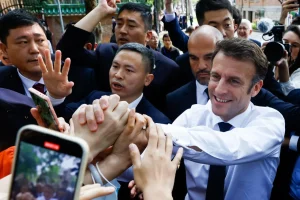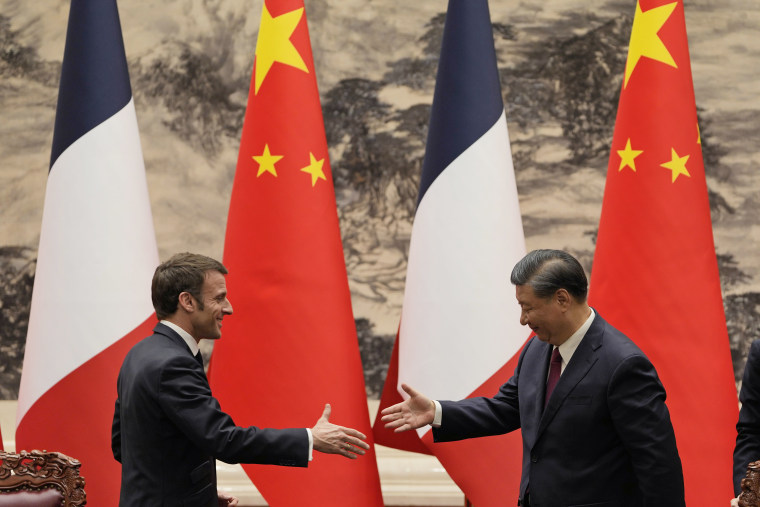French President Emmanuel Macron’s recent visit to China was met with criticism from allies, including concerns from Washington to Brussels. However, his hosts in China were thrilled with his visit, and hundreds of cheering people welcomed him to the southern Chinese metropolis of Guangzhou during his high-profile state visit.
Qiao Jiabao, a financial journalism student at Sun Yat-sen University, where Macron delivered a speech, said that the French president was gracious and proactive, despite the language barrier. He added that Macron was treated so well in China that he might not want to go back to France, where he faced mass protests over his unpopular plan to raise the retirement age.
However, when Macron returned to France, he faced another wave of criticism over his suggestion that Europe should focus on “strategic autonomy” independent from both the United States and China and avoid being drawn into a conflict over Taiwan.

His comments drew a furious backlash and raised concerns that Beijing might be succeeding in sowing division between Washington and its allies as part of its push for a world in which America has to compete for dominance with multiple other powers.
But they were celebrated in China, where the state-backed nationalist tabloid Global Times said they signaled “a dead end for the U.S. strategy of luring Europe to contain China.” Lu Shaye, the Chinese ambassador to France, said Tuesday that Macron “spoke great truths” in the tradition of French independence.
“President Macron’s remarks have aroused a great echo at the international level,” he said on Twitter.
The status of Taiwan, a self-ruling democracy that Beijing claims as its territory, is the biggest flashpoint in U.S.-China relations, and Macron’s comments were published as China was conducting live-fire military exercises near the island in response to House Speaker Kevin McCarthy’s meeting in California with Taiwanese President Tsai Ing-wen.
“The worst thing would be to think that we Europeans should follow suit on this subject and adapt to the American rhythm and a Chinese overreaction,” Macron told Politico and the French newspaper Les Échos as he flew back from China. “Why should we go at the pace chosen by others?”
Macron later clarified that France’s Taiwan policy — recognizing Beijing as the sole legitimate government of China, while maintaining unofficial relations with Taipei, the same policy as the U.S. — had not changed. But he also defended his earlier comments, saying Europe had the right to act independently.
Being an ally “doesn’t mean being a vassal,” he said at a news conference in Amsterdam last week.
The White House has minimized Macron’s comments, saying it is “comfortable and confident” in the U.S. alliance with France, but they were heavily criticized by Republicans as underestimating the threat from China.
And Macron’s words were still reverberating as foreign ministers from the Group of Seven nations, which include the United States and France, gathered in Karuizawa, Japan, over the weekend. In a joint communiqué released Tuesday, the diplomats stressed unity as they said they recognized the importance of “engaging candidly” with China, the world’s second-largest economy while working together on areas of common interest.
The Chinese Foreign Ministry said Tuesday that the G-7 statement “grossly interfered in China’s internal affairs” and that it had protested to Japan, which holds the group’s rotating presidency.
“The communiqué reflects the group’s arrogance, prejudice, and deliberate desire to block and contain China,” spokesperson Wang Wenbin said at a regular news briefing.
Macron is among a number of European leaders to visit Beijing in recent months, including German Chancellor Olaf Scholz and Spanish Prime Minister Pedro Sánchez. But Chinese President Xi Jinping lavished extra attention on the French president, personally traveling with him to Guangzhou.
Macron was warmly received not only by Xi but also by the Chinese public, who showered him with praise on social media.
Zhao Qing, who works in retail in eastern China, said Macron’s visit was a friendly sign and gave a boost to Chinese relations with France, as well as other European countries.
“I had a good impression when my wife and I visited France before, and maybe I can go there again in the future,” he said.
Macron and other leaders have good reason to visit China, said Wang Yiwei, director of the Center for European Studies at Renmin University of China in Beijing, even as efforts to reschedule Secretary of State Antony Blinken’s postponed trip to Beijing appear to stall.
“The visit really emphasized that China is a partner of Europe, not a rival,” Wang said.
If Europe distances itself from China as well as Russia, “their energy issue, economics, safety will solely depend on the U.S.,” he said. “Is that good for Europe?”
Chinese Foreign Minister Qin Gang told reporters last month that “China-Europe relations are not targeted, dependent, or subject to third parties.”
Critics said Macron’s comments undermined the image of European unity he was trying to project by visiting China at the same time as Ursula von der Leyen, the European Commission president.

The Continent has struggled with how to balance economic concerns and rising tensions over Taiwan, human rights, and the war in Ukraine. But, at least in public, leading officials have stuck close to their U.S. allies.
In a speech on relations between the EEuropean Union and China last month, von der Leyen acknowledged Beijing’s might while calling on it to use that power responsibly on issues such as the Russian invasion of Ukraine, which Beijing has refused to condemn.
“It was actually a very clear message she was trying to convey, and Macron blurred this message tremendously in my view,” said Maria Demertzis, a senior fellow at Bruegel, a think tank based in Brussels.
Unlike the U.S., the E.U. — China’s largest trading partner — has viewed Beijing as an economic partner more than a security threat, she said.
“It does not consider China the enemy in ways that I think the U.S. does,” Demertzis said.
Von der Leyen’s speech indicated that the E.U., which has long tried to balance its relations with Washington and Beijing, is now “not totally aligned but siding with the U.S.” in its approach to China, she said.
But unless it speaks to Beijing with one voice, Demertzis said, “I think Europe risks not being taken seriously, quite frankly.”
In another speech Tuesday, von der Leyen said the relationship with China was too important for Europe not to define its own strategy.
“I believe we can — and we must — carve out our own distinct European approach that also leaves space for us to cooperate with other partners, too,” she told the European Parliament.
“And the starting point for this is the need to have a shared and very clear-eyed picture of the risks and the opportunities in our engagement with China.”


